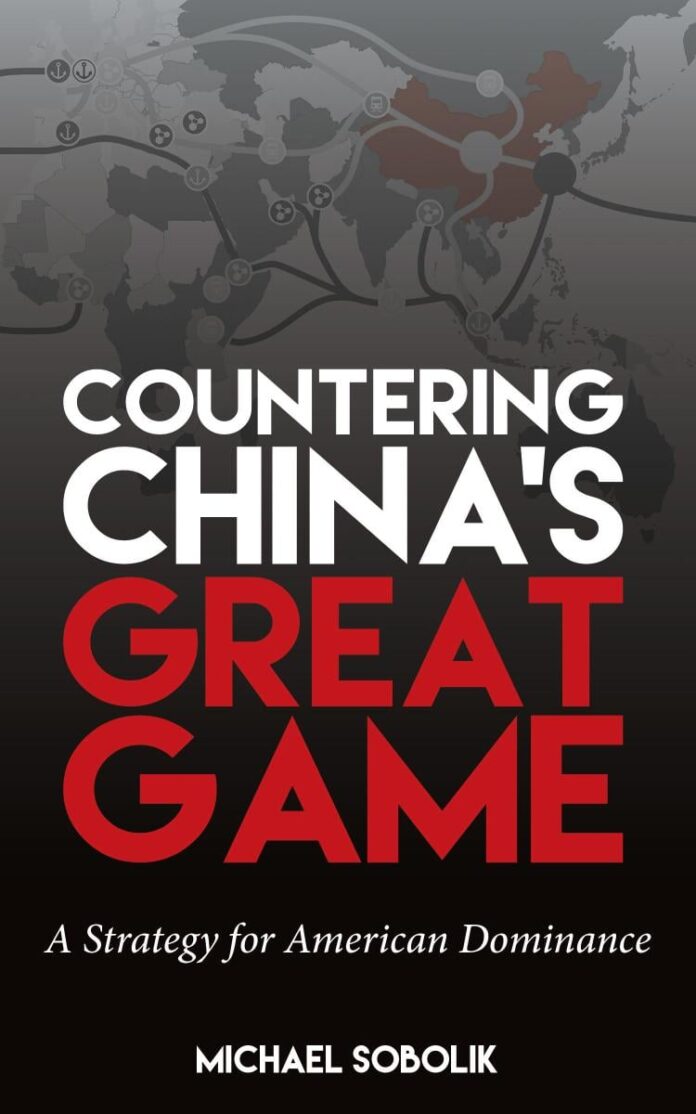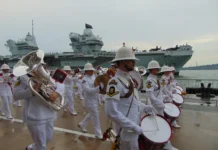
Countering China’s Great Game; A Strategy for American Dominance. By Michael Sobolik. Naval Institute Press, Annapolis, Maryland, 2024.
Reviewed by Tim Coyle
In October 2016, the Australian Ambassador to the Philippines urged the Philippines to keep close relations with both the United States and China as Philippine President Rodrigo Duterte threatened to move away from Washington and closer to Beijing.
‘Australia, like the Philippines, is an ally of the United States, and we’re also a close friend of the Philippines. We also have a very close relationship with China. We don’t see the need to choose between our alliance with the United States and our strong bilateral relationship with China,’ and ‘we very much hope that the Philippines pursues a similar course to the one that we have taken,’ the Ambassador concluded.
America’s top diplomat for East Asia, US Assistant Secretary of State Daniel Russel, also said ‘We don’t want countries that have to choose between the US and China.’ (Australia to PH: No need to choose between US, China (rappler.com).
‘We don’t have to choose…’ is a term which has been overtaken by events – the same way as the need to ‘contain China’. ‘Enforcing the Rules-Based Order’ is also looking decidedly wobbly in the posturing and manoeuvring between the People’s Liberation Army (PLA) air and maritime forces and the US and its Allies and Partners.
The exponential PLA capability enhancements since Xi Jinping’s rise to power in 2013 has forcibly reordered ‘Western’ strategic thinking. The West welcomed the reforms of Chines leader Deng Xiaoping who, from the 1970s to his death in 1997, abandoned many of the standard communist mores in favour of moving China to a more capitalistic economy and outlook to achieve ‘free enterprise’. The West leapt to this opportunity and rushed politically and economically to embrace the new China. The fuzzy welcoming of China’s capitalistic transition, particularly by the US, would surely lead to a gradual move away from Chinese Communist Party (CCP) Maoist-Marxist ideology to an embrace of democracy. The nasty business of the 1989 Tiananmen Square democracy crushing would be forgotten in the bright sunlit uplands of Sino-Western cooperation.
Michael Sobolik is a Senior Fellow in Indo-Pacific Studies at the American Foreign Policy Council where he specialises in American and Chinese grand strategy, regional economic and security trends, America’s alliance architecture in Asia, and human rights. In Countering China’s Great Game, Sobolik starkly focuses on the West’s failure to identify the warning signs of China’s emergent ideological, economic and military power. He’s not the first to do so, but he pulls no punches in laying the West’s challenges on the line (the ‘West’ also includes Australia, Japan and other like-minded countries). Sobolik writes for an American readership, and while his solutions to countering China’s Great Game are US-specific, there are strong overtones and linkages to like-minded Allies and Partners on how they might follow in kind.
Sobolik dives deeply into the ‘naïve triumphalism’ (his term) of the US dealings with firstly the collapsed Soviet Union and then the yawning potential of the Chinese regime’s course change to a capitalist powerhouse, albeit as a one-party state. The ‘inscrutable’ Chinese lured the gullible West into a false security blanket of mutual economic munificence.
He follows this critique by delineating the dynastic history of China and examines the philosophy of ‘zhonngguo’ (the Middle Kingdom), and ‘tainxia’ (Under Heaven). He argues the CCP is the contemporary exemplar of these ancient Chinese characteristics and, through them, seeks global ascendency through the Belt and Road Initiative (BRI). The bedrock of the CCP is its grip on power and it will brook no internal or external criticism or challenge to its unassailable pre-eminence. Claims that the PRC has no territorial claim apart from Tiawan are specious as the BRI and associated programs of Chinese influence are aimed at demonstrating to client states the superiority of the Chinese system.
Foreign Powers – specifically Britain, the US, Japan and a number of European states, abused China, principally in the 19th century (the Opium wars, the Boxer Rebellion etc), which continued well into the 20th century with the European concessions, protected by warships of the imperialistic Powers. Japanese atrocities, particularly the appalling Rape of Nanking and the devastating ruin of the Second World War, saw the country riven by civil war. The corrupt Kuomintang government was easy prey for the communist cadres who took China on the Long March under Mao Zedong.
The objective observer might conclude that the statement, attributed to Mao in October 1949 at the Proclamation of the People’s Republic of China, that the ‘Chinese people have stood up’ (an attribution disputed in some commentaries) was justified, given China’s brutal modern history. It might also be concluded that it is unsurprising that the PRC is a one-party state. The culmination of China’s history is now a shared Western contemporary security issue, together with resurgent totalitarianism in the Russian Federation, North Korea, Iran, and fellow travellers in some ostensibly democratic countries.
Sobolik states most Americans see China as a threat; however, they don’t fully understand PRC foreign policy is focussed on dismantling the US-led ‘world order’ and weakening of the American political system.
Post World War Two American foreign policy and international military interventions have generated antagonism in some quarters. At the same time, the US has been the visionary world power which rebuilt post war Europe (for example, the Marshall Plan) and brought economic and democratic benefits to much of the world. America’s Alliances and Partnerships should form an international bulwark against totalitarianism; the US consistently states the value of its network of alliances, which is reassuring to smaller nations. However, many in these partner nations perceive the fracturing of the US federal political establishment and the resultant divisiveness within the US could lead to diminishing American influence and capability from its leadership role.
There are many worthy writings on the China threat; however, few suggest practical measures to meet the challenge. So, how does Sobolik plan to Counter China’s Great Game?
Building on his analysis of the Chinese dynasties in history, and linking these directly to contemporary PRC perceived priorities, Sobolik advocates strategies to outsmart the totalitarian regime. This involves ‘setting the tenor and tempo of competition on favourable strategic terrain’ by identifying the regime’s weaknesses and exploiting them. Authoritarian regimes through history subjugate their peoples and institutions. Sobolik observes that the CCP is afraid of its people – demonstrations in Chinese cities during Covid lockdowns were brutally suppressed, as was the 1989 Tiananmen Square revolt. The CCP cannot be tamed, says Sobolik, but it can be mitigated. How? By a Global Magnitsky Sanctions on BRI-affiliated entities – particularly those industries in Xinjiang province where production is allegedly staffed by forced labour – which would weaken Chinese commercial advantages.
Sobolik argues that should the CCP lose the ‘Mandate of Heaven’ in its people’s eyes, the very legitimacy of the party would come under extreme pressure. America must win against the internal weaknesses of the Chinese communist monolith.
To win, Sobolik insists that the US must place country before politics. Allies and Partners supporting the US will expect nothing less. There must be a national mobilisation (beyond the military) of diplomacy, trade, financial and commercial measures, coordinated with like-minded Allies and Partners, to achieve a strategic victory, without recourse to war. In summary, Sobolik argues, Xi Jinping is using the BRI to diminish the US (and the West’s) world standing and to entrench Chinese authoritarianism globally, in association with Putin’s ‘forever friendship’.
As noted above, Countering China’s Great Game is not only a book for a US readership. Middle-ranking powers, such as Australia, can play a role in this campaign but that role must be measured, and tailored to those countries’ geo-political strengths. China can stand over smaller powers allied to the US as witnessed by the punishing trade sanctions imposed by the PRC after clumsy Australian government statements regarding responsibility for Covid. With a change in government in 2022, the relationship has since been ‘stabilised’ at the diplomatic and commercial level; however, PLA air and maritime assets continue to harass Australian Defence Force ships and aircraft. This is a Chinese strategy to exert military pressure on the one hand while promising an easing on the diplomatic and commercial front.
Countering China’s Great Game is an important work. International readers should consider how their countries might react in both supporting the US and identifying and refining their own discrete assets and advantages to deploy in this multi-generational struggle.
‘May you live in interesting times’…



